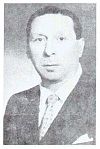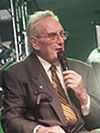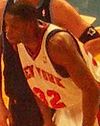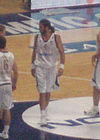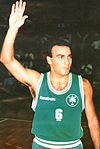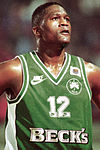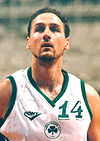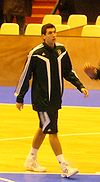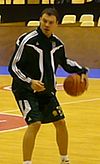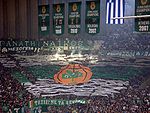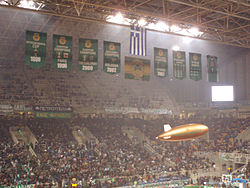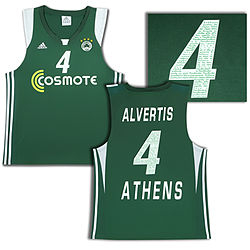- Panathinaikos B.C.
-
Panathinaikos B.C. 
Nickname The Shamrock
The Greens
Six-StarredLeagues Greek Championship
Greek Cup
EuroleagueFounded 1922 Arena Olympic Indoor Hall
seating capacity:
18,500
(fan seating)
18,800
(with media seats)
19,250
(with media and VIP seats)Location Athens, Greece Team colors Green and White
President Pavlos Giannakopoulos Head coach Željko Obradović Championships 6 European Championships
1 Intercontinental Cup
32 Greek Championships
12 Greek Cups
2 Triple CrownsWebsite paobc.gr Uniforms Active departments of Panathinaikos 


Football Basketball Volleyball 


Water Polo Swimming Athletics 


Table Tennis Wrestling Weightlifting 


Boxing Fencing Cycling 


Shooting Archery Club Panathinaikos Basketball Club is the professional basketball team of Athens-based multi-sport club Panathinaikos. The team also goes by the name of P.A.O., which stands for Panathinaikos Athlitikos Omilos (i.e. Panathenian Athletic Club). It is owned by pharmaceutical magnates Pavlos and Thanassis Giannakopoulos. The parent athletic club was founded in 1908, while the basketball team in 1922 and it has since developed into the most successful basketball team in Greece and among the best in Europe. Panathinaikos has won 32 Greek Championships, 12 Greek Cups, 6 European Championships, 1 Intercontinental Cup and 2 Triple Crowns.
Well-known players that have played with the club over the years include: Dominique Wilkins, Byron Scott, Antonio Davis, Dino Rađa, Rony Seikaly, John Salley, Nikos Galis, Dejan Bodiroga, Panagiotis Giannakis, Željko Rebrača, Stojko Vranković, Žarko Paspalj, Fanis Christodoulou, Šarūnas Jasikevičius, Fragiskos Alvertis, Dimitris Diamantidis and Vassilis Spanoulis, among others. Such players, along with the successful management of Pavlos Giannakopoulos and the guidance of the most successful coach in Europe Željko Obradović, have made Panathinaikos the most successful team in Europe the last two decades and the only team on the continent that has won six Euroleague titles, since the establishment of the modern era Euroleague Final Four format in 1988 (no other club has won more than three Euroleague championships in this period). Overall, and on the basis of the club's achievements in both Greece and Europe, Panathinaikos B.C. is the most successful Greek sports team ever.
Contents
- 1 History
- 2 Fans
- 3 Roster
- 4 Honours
- 5 International record
- 6 Seasons
- 7 Top Panathinaikos players in games, points and rebounds in the A1 Division
- 8 See also
- 9 References
- 10 External links
History
1918–1945
Panathinaikos started as a football club in 1908. In 1918, basketball was still unknown in Greece. During that period Giorgos Kalafatis attended basketball games between the Allies of World War I, in Paris. When he later returned to Greece with the necessary equipment, he set up the Panathinaikos basketball club, led by Apostolos Nikolaidis.
In 1922, PAO played their first match against the (Greek) YMCA, a match which took place at the Pan-athenian Stadium. Regrettably, the lack of equipment and interest quickly led to the dissolution of the team.
In 1937, Kalafatis managed to create a new Panathinaikos team that, during the following year, tried to catch up with already established clubs like the YMCA, Ethnikos Athinon, Panionios, Aris and Iraklis. Angelos Fillipou, Nikos Mantzaroglou, Litsas and Dimitrakos were the ringleaders of the group and were later joined by Telis Karagiorgos, Thymios Karadimos, Giorgos Bofilios, Philipos Papaikonomou, Petros Polycratis and Nickos Polycratis. During the German occupation that followed, PAO managed to keep the basketball team alive.
Postwar history
1946–1960
In 1946 (the first post-war championship) and 1947, Panathinaikos emerged champions, with the help of players like Giannis Lambrou, Missas Pantazopoulos, Stelios Arvanitis (these players would later go on to win the bronze medal in Eurobasket 1949) and Jack Nicolaidis (nephew of Apostolos Nikolaidis).
In 1950 and 1951, Panathinaikos emerged champions once again with the help of great athletes Fedon Matheou (the patriarch of Greek basketball) and Nikos Milas. In 1954 the club would repeat the success, however the next five years would prove fruitless and the club, despite its strength, would have to be renewed.
1960–1970
In 1961 Panathinaikos won the Greek championship with new leaders Giorgos Vassilakopoulos, Stelios Tavoularis and Petros Panagiotarakos. In 1962 Panathinaikos made the repeat and was again the Greek champion. That was also the year that PAO took part in a European competition facing Hapoel Tel Aviv for the European Championship.
In 1967, Panathinaikos were crowned champions, with Giorgos Kolokithas – one of the greatest basketball players of his era – in their ranks. In 1969, the conquest of the Championship was followed by the first European success of the club, namely the entrance in the semi-finals of the Cup Winners Cup, where it was eliminated by Dinamo Tbilisi. The next year, 1970, PAO were the first Greek basketball team to use a foreign player (Craig Greenwood) in a European game.
The Golden Age 1970–1984
During these golden years, Panathinaikos won 10 out of 14 Greek championships[1] with their great leader and scorer Apostolos Kontos.
1971–1975
During this period, Kostas Mourouzis, nicknamed the fox of coaching, managed the team of the 4-K (the young Kontos, Koroneos, Kokolakis and Kefalos). These players, along with Iordanidis, who functioned as a link with older players, won 5 consecutive championships and made the greatest accomplishment of their time by participating in the semifinals of the European Championship, aided by American Willy Kirkland. Unfortunately, Ignis Varese, one of the giants of the era, proved an insurmountable obstacle for Panathinaikos.
1976–1979
Over the next 4 seasons Panathinaikos captured the championship once in 1977 and also won their first Greek Cup in 1979. They acquired Memos Ioannou in 1974 and Greek-American David Stergakos in 1979 (a player that would contribute greatly in the coming years).
1980–1984
The five years that followed, Panathinaikos won 4 championships (1980, 1981, 1982, 1984) and two cups (1982, 1983). More specifically, in 1982, coached by Kostas Politis, PAO succeeded in winning their first double as well as placing 5th in Europe. Before this Panathinaikos got the better of a strong CSKA team in the last seconds of a thriller match. The last championship before the decline was 1984 when PAO won the big game title in Corfu, starring Liveris Andritsos and Tom Kappos. Panathinaikos had a great chance to avoid the upcoming decline when he discovered Rony Seikaly but bureaucratic problems prevented him from playing in the Greek Championship as a Greek citizen despite being entitled to do so, which forced him to move to the USA.
The great decline 1985–1992
1985–1988
In 1985, PAO finished in 3rd place in the league. Stergakos, Ioannou, Vidas, Andritsos and Koroneos – who left the following year – were the key players. The balance however had now tilted in favour of Aris and Panathinaikos ceased to be a leader and were limited to a secondary role. Nevertheless, they remained a worthy adversary. Thus, in 1986, against all odds, they managed to eliminate powerful Aris from the Greek Cup at the semifinal stage. Then Panathinakos went on to win Olympiakos in the final and conquer their last title until 1993. During the next 2 seasons, PAO would finish in 5th place (worst result since many years ago).
1989–1992
In 1988, the ban on using foreign players in the league was lifted and Panathinaikos were able to acquire Edgar Jones from the NBA. He was a capable shooter, scorer and rebounder and for the next 2 years was the star of the team. Although PAO achieved significant wins over the other major Greek teams, they did not manage any notable distinction. The next two years, Antonio Davis, who had later a great career in the NBA, replaced Jones as the leader of the team stats. At this point of time, Panathinaikos had also acquired some of the most talented young Greek players (Fragiskos Alvertis, Nikos Economou and Christos Myriounis), but that didn't stop them from experiencing the worst period in the history of the club, finishing 7th in 1991 and dropping to 8th position in 1992, which left them for the first time ever outside Europe.
Return to distinction 1992–1995
Nikos Galis was the man responsible for the rebirth of the team. With his effort Panathinaikos transformed into a very strong team, capable of claiming all the titles. However his retirement during the 1994–95 season deprived the team of the opportunity to conquer any major title.
1992–1994
In the summer of 1992, Panathinaikos attempted a full reconstruction of the team. Nikos Galis, the top Greek basketball player, was acquired by the club and was flanked by star players Stojko Vranković, Tiit Sokk and Arijan Komazec. Thus, Galis lead PAO to a Greek Cup win and also to the Championship final, where they lost despite home advantage. The next season 1993–94 Nikos Galis along with Alexander Volkov and Stojko Vranković led Panathinaikos to 3rd place in Europe for the first time in the club's history, although they didn't manage any title back home.
1994–1995
The 1994–95 season started with the best conditions as the club acquired Panagiotis Giannakis and Žarko Paspalj. PAO was again the favourite for all domestic titles. The club started by eliminating Olympiakos from the Greek Cup in a very tough game before the start of the Championship. However, after the first games for the Greek Championship, Nikos Galis, the player that had led PAO in the cup game against Olympiakos and also in the decisive game for the Euroleague qualifiers, left the team. As a consequence, PAO – despite playing some great games – only managed to retain 3rd place in Europe and compete in the Greek Cup final.
European, Intercontinental and Greek Champions 1996–1998
During the years 1996–98, Panathinaikos fulfilled all of their objectives by winning the European Championship, the Intecontinental cup and the Greek championship (in this order).
1995–1996
The expectations in the team had now risen a lot, as it was imperative for Panathinaikos to obtain a significant title. In the summer of 1995, they acquired Dominique Wilkins, one of the top American players playing in Europe. The coach of the team was Božidar Maljković. The former along with Giannakis, Vranković, Alvertis and Patavoukas comprised a very experienced team, which, in 1996, managed an unprecedented success for Greek basketball. Indeed, in April 1996, at the Paris Final Four, Panathinaikos became the first Greek team to lift the European Championships (now called the Euroleague), beating FC Barcelona in a unique tournament final, by a score of 67–66. Back in Greece, right after the big win in Paris, the exit of Dominique Wilkins in the league final led to the loss of a championship from Olympiakos with 35 points difference.
1996–1997
The next season, Maljković removed all the stars from the roster in an attempt of assembling a squad that's based on teamwork. With the start of the season, PAO were crowned Intercontinental Champions, prevailing by 2–1 wins in a 3-game series over Olimpia de Venado Tuerto, South American champions. Unfortunately, the restructuring of the team failed and Panathinaikos failed to participate in the Final Four to defend their European title. Moreover, they finished in 5th place in the championship, thus losing the right to participate in next season's Euroleague.
1997–1998
Lefteris Subotic assumed technical leadership and convinced Dino Rađa to come to PAO. This great transfer was accompanied by Byron Scott and Fanis Christodoulou and with the help of Alvertis, Economou and Koch, Panathinaikos finally won the Greek league after 14 years.
1999 – The championship inside SEF
The 1998–99 season proved very important for Panathinaikos, as Olympiakos who had gained home advantage were prepared to return to the top. It was at the last game of the finals that Panathinaikos achieved one of the most decisive away victories against Olympiakos, capturing the title. Not only that, but this loss led to a process of renewal and reconstruction for Olympiakos, which would fail for the next many years.
Obradović era – glory in Greece and Europe
The arrival of Željko Obradović to Panathinaikos during summer 1999 marked the beginning of an extraordinary period for the club, with many major successes and the establishment of the team as the strongest in Europe.
2000–2002
The first thing that Obradovic did was to adapt the whole team on Dejan Bodiroga, who was the absolute leader of Panathinaikos. As a result of the success of this strategy, PAO managed to capture 2 Euroleague titles (2000, 2002) after 3 consecutive Euroleague finals appearances (2000–2002) and also won 3 consecutive Greek championships (1999–2001). Nevertheless, they failed to conquer the Greek Cup, even though they played in two finals. Rebrača, Gentile, Middleton, Alvertis, Kattash, Kutluay and Fotsis were some of the players who excelled in this area. The dominance in the Greek league was finally interrupted in 2002, the year that PAO won their 3rd European Championships. Also at the end of the year, there were many significant changes, starting with the withdrawal of Bodiroga, making a renewal imperative.
Euroleague 2000
At the Thessaloniki Euroleague Final Four, Panathinaikos became Champions of Europe for the second time, beating Macabbi Tel Aviv 73–67 in the final.
Euroleague 2002
At the Bologna Euroleague Final Four, Panathinaikos brought to Athens the most prestigious European trophy for the third time, beating hosts Kinder Bologna by the score of 89–83 in the final.
Emphasis on teamwork 2003–2009
2002–03 was the year that Obradovic used to restructure Panathinaikos and return them to the top of Greece. He emphatically achieved this objective by leading the team to 4 doubles and 2 triple crowns (i.e. double plus Euroleague champions) in the next 7 years, thus creating an empire. Panathinaikos had radically changed the style of their game after replacing Bodiroga. The game contribution of the Serbian player was replaced by an unprecedented model of teamwork that proved that a super star was unnecessary. Players such as Lakovic, Alvertis, Diamantidis, Fotsis, Tsartsaris, Batiste and later Spanoulis, Siskauskas and Jasikevicius, who played not for themselves but for the maximum success of the team led to the transformation of PAO into a title-winning machine that was not hampered by irreplaceable players and this quality was widely recognized.
Euroleague 2007
At the 2007 Euroleague Final Four, which was held on their home court of OAKA in Athens, Panathinaikos became European Champions for the fourth time, beating the defending champions CSKA Moscow 93–91 in the final.
Euroleague 2009
The same teams (PAO and CSKA) competed in the final of the 2009 Euroleague Final Four Berlin, where Panathinaikos won the trophy again, for the fifth time in their history. The score was 73–71.
On December 14, 2009 Panathinaikos was voted top team of 2009 by the Sports Journalists Association, with 1,291 votes. In addition, coach Zelimir Obradovic was voted top coach, with 1,399 votes.
Euroleague 2011
Panathinaikos after a beautiful performance of Calathes in the semi-final against Siena scoring 17 points,grabbing 6 rebounds and making 2 steals win 77–69 and reach to the final against Maccabi Tel Aviv.In the Final Panathinaikos win 78–70 and won the 6th European trophy.
Less significant European successes
Panathinaikos has advanced to the Final Four of the Euroleague (and its predecessor) another four times: Tel Aviv in 1994 (3rd), Zaragoza in 1995 (3rd), Paris in 2001 (2nd) and Moscow in 2005 (3rd). Other significant successes are: the two participations in the semifinals of the Cup Winners' Cup (1969, 1998), as well as the road to the semi-finals of the Champions' Cup for the season 1971–72 (eliminated by Ignis Varese (78–70, 55–69). In the 1981–82 season, Panathinaikos participated in the finals of the Champions' Cup of that time, eliminating the teams of CSKA Moscow and Levski Sofia in that order.
Against NBA teams
Panathinaikos is the first Greek team to ever play in the USA against NBA teams. On October 11, 2007, Panathinaikos played against the Houston Rockets,[2] and on October 18, 2007, Panathinaikos played against the then defending NBA champions, the San Antonio Spurs Before that, they played against the Toronto Raptors.[3]
Fans
The team, which is famous for its fans' passionate support, also set a record (broken in 2009) for the highest home game attendance in the history of the Euroleague, which is 20,000 fans,[4] achieved at a home match in OAKA against Benetton Treviso on March 29, 2006, for the second phase of the Euroleague 2005-06. An attendance of 18,900 fans has also been achieved three times in home matches of the Greens, against Efes Pilsen in 2005 and TAU Cerámica (twice) in 2006. While PAO no longer holds the record for largest Euroleague home crowd, it still holds the honor of being involved in the record match—PAO was the opponent for Partizan Belgrade when it drew 22,567 to Belgrade Arena for a 2009 match.[5]
Roster
Panathinaikos BC rosterPlayers Coaches Pos. # Nat. Name Ht. Wt. Age PG 5 
Zoubos, Fotis 1.90 m (6 ft 3 in) 85 kg (187 lb) 18 C 6 
Maric, Aleks 2.11 m (6 ft 11 in) 124.6 kg (275 lb) 27 SF 7 
Perperoglou, Stratos 2.03 m (6 ft 8 in) 106.5 kg (235 lb) 27 F/C 8 
Batiste, Mike 2.04 m (6 ft 8 in) 113.5 kg (250 lb) 33 C/G 9 
Logan, David 1.85 m (6 ft 1 in) 84 kg (185 lb) 28 G/F 10 
Sato, Romain 1.95 m (6 ft 5 in) 100 kg (220 lb) 30 C/M 11 
Calathes, Pat 2.08 m (6 ft 10 in) 104.5 kg (230 lb) 25 F/C 12 
Tsartsaris, Kostas 2.10 m (6 ft 11 in) 115.5 kg (255 lb) 32 PT/F 13 
Diamantidis, Dimitris (C) 1.98 m (6 ft 6 in) 100 kg (220 lb) 31 C 14 
Vougioukas, Ian 2.12 m (6 ft 11 in) 127 kg (280 lb) 26 PG 15 
Calathes, Nick 1.98 m (6 ft 6 in) 88.5 kg (195 lb) 22 SG 16 
Kyritsis, Alexis 1.98 m (6 ft 6 in) 97.5 kg (215 lb) 29 PF 17 
Smith, Steven 2.06 m (6 ft 9 in) 113.4 kg (250 lb) 28 C/M 18 
Kaimakoglou, Kostas 2.05 m (6 ft 9 in) 113.4 kg (250 lb) 28 PG 19 
Jasikevičius, Šarūnas 1.93 m (6 ft 4 in) 93 kg (205 lb) 35 - Head coach
- Assistant coach(es)
- Legend
- (C) Team captain
- (*) Playing only in Euroleague
Roster
Updated: 2010-12-09Depth Chart
Pos. Starter Bench Bench Reserve C Aleks Marić Mike Batiste Ian Vougioukas PF Steven Smith Kostas Tsartsaris Pat Calathes SF Romain Sato Stratos Perperoglou Kostas Kaimakoglou Pat Calathes SG Nick Calathes David Logan Alexis Kyritsis PG Dimitris Diamantidis Šarūnas Jasikevičius Fotis Zoubos Honours
National
- Greek Championship: (32)
- 1946, 1947, 1950, 1951, 1954, 1961, 1962, 1967, 1969, 1971, 1972, 1973, 1974, 1975, 1977, 1980, 1981, 1982, 1984, 1998, 1999, 2000, 2001, 2003, 2004, 2005, 2006, 2007, 2008, 2009, 2010, 2011
- Greek Cup: (12)
- 1979, 1982, 1983, 1986, 1993, 1996, 2003, 2005, 2006, 2007, 2008, 2009
International
- European Championship – Euroleague: (6)
- 1996, 2000, 2002, 2007, 2009, 2011
- Intercontinental Cup: (1)
- 1996
- Triple Crown: (2)
- 2007, 2009
International record
Season Achievement Notes European Champions' Cup 1971–72 Semi-final eliminated by Ignis Varese, 78–70 in Athens, 55–69 in Varese 1981–82 Final round 5th place 1993–94 Final four 3rd place in Tel Aviv 1994–95 Final four 3rd place in Zaragoza 1995–96 Winner defeated Barcelona 67–66 in Paris 1996–97 Quarter-final eliminated by Olympiacos, 49–69 at home, 57–65 away 1998–99 Quarter-final eliminated by Teamsystem Bologna, 58–63 in Athens, 64–88 in Bologna 1999–00 Winner defeated Maccabi Tel-Aviv 73–67 in Thessaloniki FIBA Suproleague 2000–01 Final defeated 81–67 by Maccabi Tel-Aviv in Paris Euroleague 2001–02 Winner defeated Kinder Bologna 89–83 in Bologna 2002–03 Top 16 3rd place in group E 2003–04 Top 16 4th place in group F 2004–05 Final four 3rd place in Moscow 2005–06 Quarter-final eliminated by TAU Cerámica, 84–72 in Athens, 79–85 in Vitoria-Gasteiz, 71–74 in Athens 2006–07 Winner defeated CSKA Moscow 93–91 in Athens 2007–08 Top 16 3rd place in group F 2008–09 Winner defeated CSKA Moscow 73–71 in Berlin 2009–10 Top 16 3rd place in group E 2010–11 Winner defeated Maccabi Tel Aviv 70–78 in Barcelona Cup Winners' Cup 1968–69 Semi-final eliminated by Dinamo Tbilisi, 81–67 in Athens, 71–103 in Tbilisi 1997–98 Semi-final eliminated by Stefanel Milano, 77–58 in Athens, 61–86 in Milan Intercontinental Cup 1996 Winner 2–1 wins against Olimpia Venado Tuerto The road to the six Euroleague victories
Euroleague 1996
Round Team Home Away 1st Round Bye 2nd Round  Žalgiris Kaunas
Žalgiris Kaunas86–66 59–56 Group Stage  Real Madrid
Real Madrid54–52 73–80  Barcelona
Barcelona74–95 57–63  Cibona Zagreb
Cibona Zagreb79–61 93–82  Orthez
Orthez67–69 87–79  Benfica
Benfica67–51 87–96  Virtus Bologna
Virtus Bologna72–69 72–69  Maccabi Tel Aviv
Maccabi Tel Aviv67–62 86–79 Quarter finals  Benetton Treviso
Benetton Treviso 70–67 69–83 65–64 Semifinal  CSKA Moscow
CSKA Moscow81–71 Final  Barcelona
Barcelona67–66 Euroleague 2000
Round Team Home Away Group Stage 1  Žalgiris Kaunas
Žalgiris Kaunas86–82 82–66  Tofaş
Tofaş79–74 64–59  Olimpija Ljubljana
Olimpija Ljubljana100–80 86–71  Real Madrid
Real Madrid96–69 66–63  ALBA Berlin
ALBA Berlin70–72 73–54 Group Stage 2  Red Star Belgrade
Red Star Belgrade 67–58 76–61  Cholet
Cholet85–50 68–81  PAOK
PAOK71–75 77–69 Round of 16  Budućnost
Budućnost65–59 64–77 78–61 Quarter finals  Cibona Zagreb
Cibona Zagreb73–62 69–63 Semifinal  Efes Pilsen
Efes Pilsen81–71 Final  Maccabi Tel Aviv
Maccabi Tel Aviv73–67 Euroleague 2002
Round Team Home Away Group Stage  Fortitudo Bologna
Fortitudo Bologna81–70 79–77  CSKA Moscow
CSKA Moscow83–80 91–85  Orthez
Orthez67–63 79–67  Budućnost
Budućnost91–82 84–72  Krka Novo Mesto
Krka Novo Mesto98–92 81–82  Zadar
Zadar102–64 85–81  Real Madrid
Real Madrid77–88 78–70 Top 16  Olympiacos
Olympiacos88–78 75–92  Olimpija Ljubljana
Olimpija Ljubljana85–67 79–72  AEK
AEK96–92 73–66 Semifinal  Maccabi Tel Aviv
Maccabi Tel Aviv83–75 Final  Virtus Bologna
Virtus Bologna89–83 Euroleague 2007
Round Team Home Away Regular Season  Joventut Badalona
Joventut Badalona83–73 82–79  Cibona Zagreb
Cibona Zagreb86–69 78–75  Olimpija Ljubljana
Olimpija Ljubljana83–74 86–65  Virtus Roma
Virtus Roma87–71 79–69  Málaga
Málaga87–72 61–67  Partizan
Partizan80–93 73–65  Maccabi Tel Aviv
Maccabi Tel Aviv90–88 73–76 Top 16  Efes Pilsen
Efes Pilsen84–57 79–65  Barcelona
Barcelona102–82 66–87  Prokom Trefl Sopot
Prokom Trefl Sopot95–68 75–69 Playoffs  Dynamo Moscow
Dynamo Moscow80–58 73–65 Semifinal  Taugres
Taugres67–53 Final  CSKA Moscow
CSKA Moscow93–91 Euroleague 2009
Round Team Home Away Regular Season  Žalgiris Kaunas
Žalgiris Kaunas78–51 80–69  Barcelona
Barcelona76–87 66–90  SLUC Nancy
SLUC Nancy83–69 80–70  Siena
Siena81–76 77–82  Prokom Trefl Sopot
Prokom Trefl Sopot75–53 67–60 Top 16  Partizan
Partizan81–63 56–63  Málaga
Málaga103–95 81–69  Virtus Roma
Virtus Roma92–67 90–71 Playoffs  Siena
Siena90–85 72–53 79–84 91–84 Semifinal  Olympiacos
Olympiacos84–82 Final  CSKA Moscow
CSKA Moscow73–71 Euroleague 2011
Round Team Home Away Group Stage 1  Power Electronics Valencia
Power Electronics Valencia69–73 72–56  CSKA Moscow
CSKA Moscow74–60 72–68  Olimpija Ljulbljana
Olimpija Ljulbljana95–88 84–85  Efes Pilsen Istanbul
Efes Pilsen Istanbul84–61 78–79  Armani Jeans Milano
Armani Jeans Milano93–62 81–71 Group Stage 2  Lietuvos Rytas
Lietuvos Rytas67–68 80–59  Unicaja Málaga
Unicaja Málaga82–56 77–61  Caja Laboral
Caja Laboral76–74 70–77 Quarter finals  Regal FC Barcelona
Regal FC Barcelona76–74 82-83 78–67 75-71 Semifinal  Montepaschi Siena
Montepaschi Siena77–69 Final  Maccabi Tel Aviv
Maccabi Tel Aviv78–70 Panathinaikos against NBA teams
10 October 2003 Toronto Raptors 
100–76  Panathinaikos
Panathinaikos Air Canada Centre, Toronto, ON
Air Canada Centre, Toronto, ON11 October 2007 Boxscore Houston Rockets 
107–70  Panathinaikos
Panathinaikos Toyota Center, Houston, TX
Toyota Center, Houston, TX13 October 2007 Boxscore San Antonio Spurs 
113–91  Panathinaikos
Panathinaikos AT&T Center, San Antonio, TX
AT&T Center, San Antonio, TXSeasons
Season A1 Ethniki Cup Europe Coach Roster 1945–46 Champion No tournament No tournament Misas Pantazopoulos Giannis Lambrou, Misas Pantazopoulos, Stelios Arvanitis, Jack Nikolaidis, Giorgos Nikolaidis, Thymios Karadimos 1946–47 Champion No tournament No tournament Misas Pantazopoulos Giannis Lambrou, Misas Pantazopoulos, Stelios Arvanitis, Jack Nikolaidis, Giorgos Nikolaidis, Dimitrakopoulos 1948–49 4th place No tournament No tournament Misas Pantazopoulos Giannis Lambrou, Stelios Arvanitis, Misas Pantazopoulos, Nikos Milas, Petros Dimitropoulos, Alekos Karalis, Fanis Theofanis, Dimitrakopoulos 1949–50 Champion No tournament No tournament Misas Pantazopoulos Fedon Mattheou, Giannis Lambrou, Misas Pantazopoulos, Stelios Arvanitis, Nikos Milas, Petros Dimitropoulos, Alekos Karalis, Panos Koukopoulos, Thanasis Koukopoulos, Fanis Theofanis, Kaligeris, Vithipoulias, Papatheoharis, Giazimis, Genimatas 1950–51 Champion No tournament No tournament Misas Pantazopoulos Fedon Mattheou, Giannis Lambrou, Stelios Arvanitis, Nikos Milas, Giorgos Oven, Fanis Theofannis, Kaligeris, Papatheoharis, Tripos, Vithipoulias, Konidis, Filipou, Yiaximis, Genimatas 1952–53 2nd place No tournament No tournament Fedon Mattheou, Giannis Lambrou, Stelios Arvanitis, Nikos Milas, Alekos Karalis, Panos Koukopoulos, Yiaximis, Konidis, Kaligeris, Eftaxias 1953–54 Champion No tournament No tournament Fedon Mattheou, Stelios Arvanitis, Nikos Milas, Panos Koukopoulos, Stelios Tavoularis, Giorgos Oven, Alekos Karalis, Giannis Malakates, Yiaximis, Varias, Konidis, Yianopoulos, Stamatiou, Kimanis 1960–61 Champion No tournament No tournament Nikos Milas Panos Koukopoulos, Petros Panagiotarakos, Makridis, Liamis, Zanos, Koutsoukos, Tavoularis, Papakonstantopoulos, Mandilaris, Dedes, Katsikidis, Nakios, Sitzakis 1961–62 Champion No tournament Euroleague
Last 32Kimonas Agathos Petros Panagiotarakos, Giorgos Vassilakopoulos, Panos Koukopoulos, Liamis, Tavoularis, Katsikidis, Zanos, Makridis, Antoniadis, Mandilaris, Panagiotidis, Papadimitriou 1962–63 4th place No tournament Euroleague
Last 16Panos Koukopoulos Petros Panagiotarakos, Giorgos Vassilakopoulos, Kostas Politis, Panos Koukopoulos, Stelios Tavoularis, Liamis, Katsikidis, Zanis 1963–64 3rd place No tournament Not participated Nikos Milas Kostas Politis, Mihalis Kiritsis, Petros Panagiotarakos, Giorgos Vassilakopoulos, Andreas Chaikalis, Gavrilos Antoniadis, Christos Antoniadis, Stelios Tavoularis, Kostas Politis, Papadimitriou 1964–65 6th place No tournament Not participated Nikos Milas Petros Panagiotarakos, Giorgos Vassilakopoulos, Kostas Politis, Mihalis Kiritsis, Andreas Chaikalis, Christos Iordanidis 1965–66 3rd place No tournament Not participated Mio Stevanovic Giorgos Kolokythas, Petros Panagiotarakos, Giorgos Vassilakopoulos, Kostas Politis, Mihalis Kiritsis, Andreas Chaikalis, Christos Iordanidis 1966–67 Champion No tournament Not participated Kostas Mourouzis Giorgos Kolokythas, Kostas Politis, Giorgos Vassilakopoulos, Mihalis Kiritsis, Petros Panagiotarakos, Thanasis Peppas, Andreas Chaikalis, Kouzoupis, Liamis, Lekkakis, Stefanou 1967–68 2nd place No tournament Euroleague
Last 16Kostas Mourouzis Giorgos Kolokythas, Kostas Politis, Petros Panagiotarakos, Thanasis Peppas, Andreas Haikalis 1968–69 Champion No tournament Cup Winners' Cup
Last 4Kostas Mourouzis Giorgos Kolokythas, Kostas Politis, Christos Iordanidis, Petros Panagiotarakos, Thanasis Peppas, Andreas Haikalis, Craig Greenwood 1969–70 2nd place No tournament Euroleague
Last 16Kostas Mourouzis Apostolos Kontos, Giorgos Kolokythas, Dimitris Kokolakis, Christos Iordanidis, Christos Kefalos, Kostas Politis, Haris Papazoglou, Petros Panagiotarakos, Thanasis Peppas, Andreas Haikalis, Andreas Papantoniou 1970–71 Champion No tournament Cup Winners' Cup
Last 16Kostas Mourouzis Giorgos Kolokythas, Christos Iordanidis, Kostas Politis, Petros Panagiotarakos, Thanasis Peppas, Andreas Haikalis 1971–72 Champion No tournament Euroleague
Last 4Kostas Mourouzis Apostolos Kontos, Dimitris Kokolakis, Takis Koroneos, Christos Kefalos, Christos Iordanidis, Michalis Kiritsis, Giannis Dimaras, Haris Papazoglou, Andreas Papantoniou, Petros Panagiotarakos, Thanasis Peppas, Andreas Haikalis, Zografos, Zegleris, Paraskevas, Willy Kirkland 1972–73 Champion No tournament Euroleague
Last 32Kostas Mourouzis Apostolos Kontos, Dimitris Kokolakis, Takis Koroneos, Christos Iordanidis, Christos Kefalos, Andreas Papantoniou, Giannis Dimaras, Andreas Haikalis, Haris Papazoglou, Sigas, Houseas, Broutsos, Bogdanos, Poulidis, Michelis 1973–74 Champion No tournament Euroleague
Last 16Kostas Mourouzis Apostolos Kontos, Dimitris Kokolakis, Christos Iordanidis, Christos Kefalos, Haris Papazoglou, Andreas Haikalis, Andreas Papantoniou, Giannis Dimaras, Houseas, Poulidis, Koumanakos, Bogdanos 1974–75 Champion No tournament Euroleague
Last 16Richard Dukshire Apostolos Kontos, Dimitris Kokolakis, Takis Koroneos, Christos Iordanidis, Christos Kefalos, Memos Ioannou, Kostas Batis, Haris Papazoglou, Andreas Papantoniou, S. Kontos, Kabourakis, Spiliopoulos 1975–76 3rd place Last 4 Euroleague
Last 16Nikos Milas Apostolos Kontos, Dimitris Kokolakis, Takis Koroneos, Christos Iordanidis, Christos Kefalos, Memos Ioannou, Kostas Batis, Haris Papazoglou, Andreas Papantoniou, Andreas Haikalis, Kampourakis, S. Kontos 1976–77 Champion Last 4 Korać Cup
Last 27Kostas Anastasatos Apostolos Kontos, Dimitris Kokolakis, Takis Koroneos, Christos Kefalos, Memos Ioannou, Kostas Batis, Andreas Papantoniou, Haris Papazoglou, S. Kontos, Kakogeorgiou, Kabourakis, Petrakakis 1977–78 2nd place Last 4 Euroleague
Last 8Kostas Anastasatos Apostolos Kontos, Dimitris Kokolakis, Takis Koroneos, Christos Iordanidis, Memos Ioannou, Christos Kefalos, Kostas Batis, Andreas Papantoniou, Haris Papazoglou 1978–79 3rd place Winners Korać Cup
Last 16Kostas Politis Apostolos Kontos, Dimitris Kokolakis, Takis Koroneos, David Stergakos, Kostas Batis, Andreas Papantoniou, Haris Papazoglou 1979–80 Champion Last 8 Cup Winners' Cup
Last 8Kostas Politis Apostolos Kontos, Dimitris Kokolakis, Takis Koroneos, David Stergakos, Memos Ioannou, Kyriakos Vidas, Kostas Batis, Andreas Papantoniou, Haris Papazoglou, Garos, Georganas, Kalogeropoulos 1980–81 Champion Last 8 Euroleague
Last 8Kostas Politis Apostolos Kontos, Dimitris Kokolakis, Takis Koroneos, David Stergakos, Kyriakos Vidas, Memos Ioannou, Andreas Papantoniou, Katsinis, Garos, Georganas, Kalogeropoulos, Metaxas 1981–82 Champion Winners Euroleague
Final-6Kostas Politis Apostolos Kontos, Dimitris Kokolakis, Takis Koroneos, David Stergakos, Kyriakos Vidas, Memos Ioannou, Kostas Batis, Andreas Papantoniou, Katsinis, Georganas, Venieris, Kalogeropoulos, Garos, Karanasos 1982–83 3rd place Winners Euroleague
Last 5Christos Kefalos Dimitris Kokolakis, Takis Koroneos, David Stergakos, Liveris Andritsos, Memos Ioannou, Tom Kappos 1983–84 Champion Last 4 Cup Winners' Cup
Last 8Michalis Kyritsis Takis Koroneos, David Stergakos, Memos Ioannou, Liveris Andritsos, Kyriakos Vidas, Giorgos Skropolithas, Tom Kappos, Tolias, Kalogeropoulos, Politis, Tsantilis, Sotiriou 1984–85 3rd place Finalist Euroleague
Last 8Michalis Kyritsis Takis Koroneos, David Stergakos, Liveris Andritsos, Kyriakos Vidas, Memos Ioannou, Giorgos Skropolithas, Tom Kappos, Tolias, Kalogeropoulos, Politis, Tsantilis, Sotiriou 1985–86 4th place Winners Cup Winners' Cup
Last 16Michalis Kyritsis David Stergakos, Liveris Andritsos, Memos Ioannou, Kyriakos Vidas, Argiris Papapetrou, Giorgos Skropolithas, Petroudakis 1986–87 5th place Last 16 Cup Winners' Cup
Last 32Kostas Mourouzis David Stergakos, Liveris Andritsos, Memos Ioannou, Takis Koroneos, Argyris Papapetrou, Giorgos Skropolithas, Kostas Missas, Dimitris Dimakopoulos, Dionysis Fragiskatos 1987–88 5th place Last 16 Korać Cup
Last 32Richard Dukshire David Stergakos, Liveris Andritsos, Memos Ioannou, Takis Koroneos, Argyris Papapetrou, Giorgos Skropolithas, Kostas Missas, Dimitris Dimakopoulos, Dionysis Fragiskatos 1988–89 3rd place Last 4 Korać Cup
Last 16Mihalis Kyritsis Edgar Jones, David Stergakos, Liveris Andritsos, Memos Ioannou, Takis Koroneos, Argyris Papapetrou, Giorgos Skropolithas, Argyris Pedoulakis, Dimitris Dimakopoulos, Dionysis Fragiskatos 1989–90 5th place Last 8 Korać Cup
Last 64Christos Iordanidis Edgar Jones, David Stergakos, Liveris Andritsos, Memos Ioannou, Takis Koroneos, Argyris Papapetrou, Giorgos Skropolithas, Argyris Pedulakis, Dimitris Dimakopoulos, Dionysis Fragiskatos 1990–91 7th place Last 4 Korać Cup
Last 16Christos Iordanidis Antonio Davis, David Stergakos, Liveris Andritsos, Giorgos Skropolithas, Argyris Pedulakis, Argyris Papapetrou, Dimitris Dimakopoulos, Wayne Yearwood, Dinos Kalambakos 1991–92 8th place Last 4 Korać Cup
Last 16Željko Pavličević Fragiskos Alvertis, Antonio Davis, Nikos Ekonomou, Christos Myriounis, Minas Gekos, David Stergakos, Liveris Andritsos, Argyris Papapetrou, Giorgos Skropolithas, Argyris Pedulakis, Dinos Kalambakos Yannis Georgikopoulos, Greg Ikonomu, Sotiris Manolopoulos, Scott Roth 1992–93 2nd place Winners Not participated Željko Pavličević Fragiskos Alvertis, Nikos Galis, Arijan Komazec, Stojko Vranković, Tiit Sokk, Nikos Ekonomou, Christos Myriounis, Argiris Papapetrou, Giannis Georgikopoulos 1993–94 3rd place Last 16 Euroleague
3rd placeKostas Politis Fragiskos Alvertis, Nikos Galis, Alexander Volkov, Stojko Vranković, Tiit Sokk, Nikos Ekonomou, Christos Myriounis, Costas Patavoukas, Yannis Papayannis, Giannis Georgikopoulos, Minas Gekos, Aivar Kuusmaa, Giorgos Chrysanthopoulos, Dionysis Kourlis 1994–95 2nd place Last 16 Euroleague
3rd placeEythimis Kiumurtzoglou Fragiskos Alvertis, Nikos Galis, Panagiotis Giannakis, Žarko Paspalj, Stojko Vranković, Miroslav Peckarski, Tiit Sokk, Nikos Ekonomou, Christos Myriounis, Costas Patavoukas, Yannis Papayannis, Giannis Georgikopoulos, Aivar Kuusmaa, Giorgos Chrysanthopoulos, Dionysis Kourlis 1995–96 2nd place Winners Euroleague
ChampionBožidar Maljković Fragiskos Alvertis, Dominique Wilkins, Stojko Vranković, Panagiotis Giannakis, Nikos Ekonomou, Kostas Patavoukas, John Korfas, Tzanis Stavrakopoulos, Miroslav Pecarski, Vagelis Vourtzoumis, Christos Myriounis 1996–97 5th place Last 4 Intercontinental Cup Winner Božidar Maljković Fragiskos Alvertis, Nikos Ekonomou, Byron Dinkins, Michael Koch, John Korfas, Marcelo Nicola, Hugo Sconochini, Ferran Martínez, Julius Nwosu, John Amaechi, Vagelis Vourtzoumis, Giannis Georgikopoulos, John Salley, Sasa Markovic, Leonidas Skoutaris Euroleague Last 8 1997–98 Champion Last 4 EuroCup
Last 4Lefteris Subotic Fragiskos Alvertis, Dino Rađa, Byron Scott, Fannis Christodoulou, Nikos Ekonomou, Antonis Fotsis, Michael Koch, Ferran Martínez, Costas Patavoukas, Sascha Hupmann, Giorgos Kalaitzis, Johnny Branch, Andreas Glyniadakis, Vagelis Vourtzoumis 1998–99 Champion Last 8 Euroleague
Last 16Lefteris Subotic Fragiskos Alvertis, Dejan Bodiroga, Dino Rađa, Nikos Ekonomou, Ferdinando Gentile, Michael Koch, Costas Patavoukas, Nikos Boudouris, Pat Burke, Sascha Hupmann, Giorgos Kalaitzis, Kostas Maglos, Alexandros Anthis 1999–00 Champion Finalist Euroleague
ChampionŽeljko Obradović Fragiskos Alvertis, Dejan Bodiroga, Željko Rebrača, Johnny Rogers, Oded Kattash, Giorgos Kalaitzis, Antonis Fotsis, Ferdinando Gentile, Michael Koch, Nikos Boudouris, Pat Burke 2000–01 Champion Finalist Suproleague
FinalistŽeljko Obradović Fragiskos Alvertis, Dejan Bodiroga, Željko Rebrača, Johnny Rogers, Pat Burke, Antonis Fotsis, Ferdinando Gentile, Giorgos Kalaitzis, Oded Kattash, Michael Koch, Darryl Middleton, Giorgos Baloyannis, Andreas Glyniadakis, Yannis Rodostoglou, Marios Voulgaridis 2001–02 3rd place Last 4 Euroleague
ChampionŽeljko Obradović Fragiskos Alvertis, Dejan Bodiroga, İbrahim Kutluay, Johnny Rogers, Darryl Middleton, Giorgos Kalaitzis, Damir Mulaomerović, Pepe Sánchez, Giannis Sioutis, Giorgos Balogiannis, Lazaros Papadopoulos, Giannis Giannoulis, Christos Vidalis, Michalis Svoronos, Serafim Theos, Corey Albano 2002–03 Champion Winner Euroleague
Last 8Željko Obradović Fragiskos Alvertis, Jaka Lakovič, Ariel McDonald, Darryl Middleton, Kostas Tsartsaris, Giorgos Balogiannis, Giorgos Kalaitzis, Antonis Fotsis, Lazaros Papadopoulos, Rodney Buford, Zouritsa Zouza, Christos Vidalis 2003–04 Champion Last 32 Euroleague
Last 16Željko Obradović Fragiskos Alvertis, Darryl Middleton, Mike Batiste, Ariel McDonald, Jaka Lakovič, Nikos Hatzivrettas, Kostas Tsartsaris, Dimitris Papanikolaou, Giannis Gagaloudis, Giorgos Kalaitzis, Dušan Šakota, Giorgos Maslarinos, Artemis Kouvaris, Haris Mujezinović 2004–05 Champion Winner Euroleague
3rd placeŽeljko Obradović Fragiskos Alvertis, Dimitris Diamantidis, Giorgos Kalaitzis, Jaka Lakovič, İbrahim Kutluay, Vlado Šćepanović, Nikos Hatzivrettas, Dimitris Papanikolaou, Mike Batiste, Kostas Tsartsaris, Lonny Baxter, Darryl Middleton, Patrick Femerling, Dušan Šakota, Vasilis Xanthopoulos 2005–06 Champion Winner Euroleague
Last 8Željko Obradović Fragiskos Alvertis, Dimitris Diamantidis, Giorgos Kalaitzis, Jaka Lakovič, Vassilis Spanoulis, Vlado Šćepanović, Nikos Hatzivrettas, Dimitris Papanikolaou, Dušan Šakota, Mike Batiste, Kostas Tsartsaris, Dejan Tomašević, Patrick Femerling, Brandon Hunter 2006–07 Champion Winner Euroleague
ChampionŽeljko Obradović Fragiskos Alvertis, Dimitris Diamantidis, Ramūnas Šiškauskas, Sani Bečirovič, Mike Batiste, Nikos Hatzivrettas, Dimos Dikoudis, Kostas Tsartsaris, Tony Delk, Dimitris Papanikolaou, Vasilis Xanthopoulos, Dejan Tomašević, Dušan Šakota, Miloš Vujanić, Robertas Javtokas 2007–08 Champion Winner Euroleague
Last 16Željko Obradović Fragiskos Alvertis, Kostas Tsartsaris, Mike Batiste, Nikos Hatzivrettas, Dimitris Diamantidis, Vassilis Spanoulis, Dejan Tomašević, Dimos Dikoudis, Sani Bečirovič, Stratos Perperoglou, Šarūnas Jasikevičius, Kennedy Winston, Andrija Žižić, Nikola Prkačin, Aris Tatarounis 2008–09 Champion Winner Euroleague
ChampionŽeljko Obradović Fragiskos Alvertis, Antonis Fotsis, Kostas Tsartsaris, Mike Batiste, Nikos Hatzivrettas, Dimitris Diamantidis, Vassilis Spanoulis, Stratos Perperoglou, Šarūnas Jasikevičius, Drew Nicholas, Nikola Peković, Giorgi Shermadini, Dimitris Verginis, Dušan Kecman 2009–10 Champion Finalist Euroleague
Last 16Željko Obradović Antonis Fotsis, Kostas Tsartsaris, Mike Batiste, Dimitris Diamantidis, Vassilis Spanoulis, Stratos Perperoglou, Šarūnas Jasikevičius, Drew Nicholas, Nikola Peković, Giorgi Shermadini, Dimitris Verginis, Nick Calathes, Milenko Tepić, Georgios Bogris, Jurica Golemac, Marcus Haislip 2010–11 Champion Finalist Euroleague
ChampionŽeljko Obradović Antonis Fotsis, Kostas Tsartsaris, Mike Batiste, Dimitris Diamantidis, Stratos Perperoglou, Drew Nicholas, Nick Calathes, Milenko Tepić, Georgios Bogris, Romain Sato, Aleks Marić, Kostas Kaimakoglou, Ian Vougioukas, Fotis Zoubos Notable players
Top Panathinaikos players in games, points and rebounds in the A1 Division
- * Still active player.
- Last update: 21 June 2011
-
Rank Player Games 1  Fragiskos Alvertis
Fragiskos Alvertis525 2  Kostas Tsartsaris*
Kostas Tsartsaris*288 3  Mike Batiste*
Mike Batiste*258 4  Nikos Ekonomou
Nikos Ekonomou243 5  Dimitris Diamantidis*
Dimitris Diamantidis*235 6  Giorgos Kalaitzis
Giorgos Kalaitzis221 7  Antonis Fotsis*
Antonis Fotsis*215 8  Nikos Chatzivrettas
Nikos Chatzivrettas204 9  Argiris Papapetrou
Argiris Papapetrou169
-
Rank Player Points 1  Fragiskos Alvertis
Fragiskos Alvertis4.698 2  Mike Batiste*
Mike Batiste*2.648 3  Dejan Bodiroga
Dejan Bodiroga2.285 4  Nikos Ekonomou
Nikos Ekonomou2.207 5  Liveris Andritsos
Liveris Andritsos2.088 6  Kostas Tsartsaris*
Kostas Tsartsaris*2.011 7  Dimitris Diamantidis*
Dimitris Diamantidis*2.002 8  Antonis Fotsis*
Antonis Fotsis*1.639 9  Jaka Lakovič
Jaka Lakovič1.596 10  Nikos Galis
Nikos Galis1.586 11  Nikos Chatzivrettas
Nikos Chatzivrettas1.507 12  Stojan Vranković
Stojan Vranković1.497
-
Rank Player Rebounds 1  Stojan Vranković
Stojan Vranković1.871 2  Fragiskos Alvertis
Fragiskos Alvertis1.399 3  Michael Batiste*
Michael Batiste*1.377 4  Kostas Tsartsaris*
Kostas Tsartsaris*1.181 5  Dimitris Diamantidis*
Dimitris Diamantidis*931 6  Antonis Fotsis*
Antonis Fotsis*895
Notable coaches
 Efthimis Kioumourtzoglou
Efthimis Kioumourtzoglou Kostas Politis
Kostas Politis Božidar Maljković
Božidar Maljković Željko Pavličević
Željko Pavličević -
- Slobodan Subotić
Slobodan Subotić Željko Obradović
Željko Obradović
See also
- Panathinaikos women's basketball
References
- ^ Panathinaikos – Welcome to EUROLEAGUE BASKETBALL, euroleague.net, accessed 04 January 2011.
- ^ NBA.com Rockets-PAO box score.
- ^ NBA.com Spurs-PAO box score.
- ^ Fragiskos Alvertis interview 20,000 fans at OAKA for PAO versus Benetton Treviso. (Greek)
- ^ "Partizan sets crowd record at Belgrade Arena!". Euroleague.net. 2009-03-05. http://www.euroleague.net/item/45551. Retrieved 2009-03-06.
External links
- Panathinaikos BC – Official Website (Greek) and (English)
- Panathinaikos BC – Official Blog
- Panathinaikos BC at Eurobasket.com
- Panathinaikos Fans' Site (Greek) and (English)
- Panathinaikos, the Greek Sports Master
- Galanis Sports Data
- Green Cyber Fans - Since 1996
Panathinaikos BC Zoubos | 6 Marić | 7 Perperoglou | 8 Batiste | 9 Logan | 10 Sato | 11 P. Calathes | 12 Tsartsaris | 13 Diamantidis | 14 Vougioukas | 15 N. Calathes | 16 Kyritsis | 17 Smith | 18 Kaimakoglou | 19 Jasikevičius | Coach Obradović Panathinaikos BC Alvertis | 6 Vourtzoumis | 7 Patavoukas | 8 Ekonomou | 9 Korfas | 10 Giannakis | 11 Vranković | 12 Wilkins (Final4 MVP) | 13 Stavrakopoulos | 14 Pecarski | 15 Myriounis | Coach Maljković Panathinaikos BC 1999–2000 Euroleague Champions Panathinaikos 2001-02 Euroleague Champions Panathinaikos BC 2006–07 Euroleague Champions 4 Alvertis | 5 Delk | 6 Papanikolaou | 7 Bečirovič | 8 Batiste | 9 Šiškauskas | 10 Hatzivrettas | 11 Dikoudis | 12 Tsartsaris | 13 Diamantidis (Final4 MVP) | 14 Xanthopoulos | 15 Tomašević | 16 Šakota | 18 Vujanić | 19 Javtokas | Coach Obradović
Panathinaikos BC 2008–09 Euroleague Champions 4 Alvertis | 5 Kecman | 6 Spanoulis (Final4 MVP) | 7 Perperoglou | 8 Batiste | 9 Fotsis | 10 Hatzivrettas | 11 Nicholas | 12 Tsartsaris | 13 Diamantidis | 14 Peković | 15 Šakota | 16 Shermadini | 17 Verginis | 19 Jasikevičius | Coach Obradović
Panathinaikos BC 2010–11 Euroleague Champions 5 Tepić | 6 Marić | 7 Perperoglou | 8 Batiste | 9 Fotsis | 10 Sato | 11 Nicholas | 12 Tsartsaris | 13 Diamantidis (Final4 MVP) | 14 Vougioukas | 15 Calathes | 17 Bogris | 18 Kaimakoglou | Coach Obradović
Players Rivalries Other Sports Greek Basket League 2011-12 Aris · A.G.O.R. Aegean · Ikaros · Ilissiakos · K.A.O.D. · Kavala · Kolossos · Maroussi · Olympiacos · Panathinaikos · Panionios · P.A.O.K. · Peristeri ·Turkish Airlines Euroleague 2011–12 Still in competition Group A · Group B · Group C · Group D
Anadolu Efes · Asseco Prokom Gdynia · Bennet Cantù · Bizkaia Bilbao Basket · Brose Baskets · Caja Laboral · CSKA Moscow · EA7 Emporio Armani · FC Barcelona Regal · Fenerbahçe Ülker · Galatasaray Medical Park · KK Zagreb · Maccabi Electra Tel Aviv · Montepaschi Siena · Olympiacos · Panathinaikos · Partizan Mt:s Belgrade · Real Madrid · SLUC Nancy · Spirou Basket · Unicaja · UNICS Kazan · Union Olimpija Ljubljana · Žalgiris KaunasEliminated in Third Qualifying Round Eliminated in Second Qualifying Round Eliminated in First Qualifying Round Banvit · BC Donetsk · BCM Gravelines · Cholet Basket · KK Budućnost · P.A.O.K. · PGE Turów · VEF RīgaCategories:- Panathinaikos
- Panathinaikos BC
- Basketball teams in Greece
- Basketball clubs established in 1922
- Sports clubs established in 1922
- Euroleague-winning clubs
Wikimedia Foundation. 2010.

